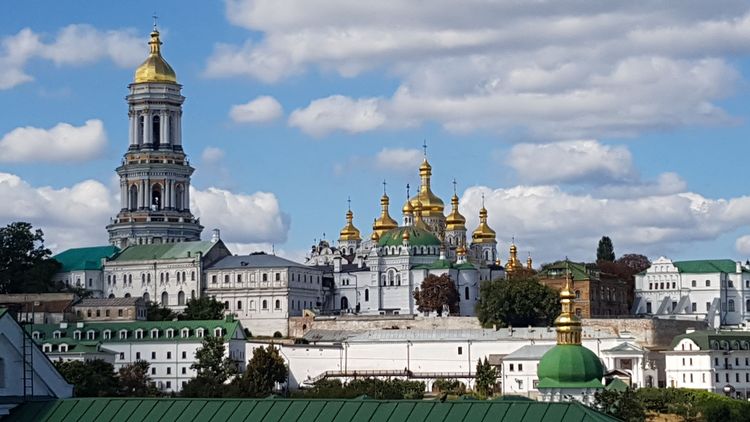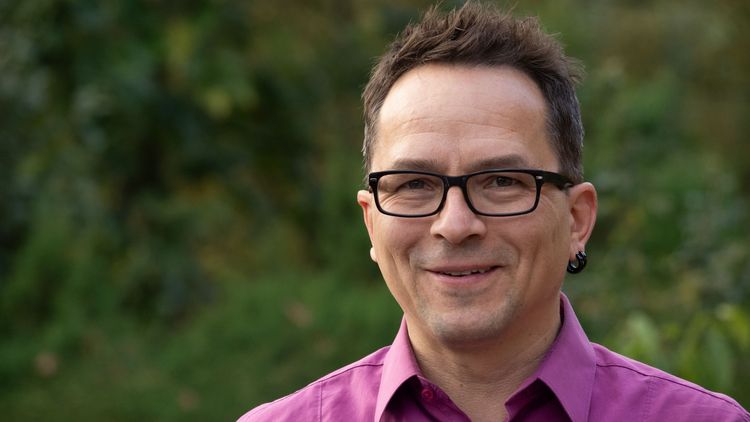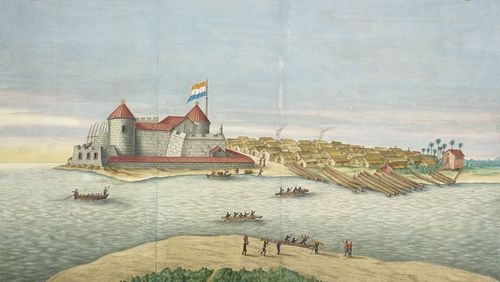The world is watching the war in Ukraine. Hans-Christian Petersen, expert for Eastern European history, knows the background to the war as well as people in Ukraine. An interview about powerlessness and hope, about the post-Soviet community in Germany and its "eastern heritage".
A few years ago you began a collaborative research project with Ukrainian partners, and in 2019 you conducted research in the Kyiv-based archives of the former Soviet secret service, the KGB. What are you hearing from Ukraine now?
The situation is dreadful. To give an example, the Ukrainian colleague who showed me around Kyiv back then comes from the eastern Ukrainian city of Dnipro. He is now doing research in Germany, but his mother still lives in Dnipro and can no longer get out. She just turned 82, on International Women's Day. The family was reminded of her second birthday in 1942, when Ukraine was under German occupation and soldiers forcibly ended the family’s birthday celebration because they assumed they were celebrating Women's Day. Eighty years have passed and now there is war again. The KGB files, which we signed an agreement to research in 2019, are also about those times: the topic is the Heim ins Reich ("back home to the Reich") resettlements under Hitler in 1939/40. In Ukraine, unlike in Russia, the entire collection of KGB files is open for research. But the Russian army has already announced that it also plans to shell the secret service archive in Kyiv – soon it may no longer exist.
You did research for your habilitation project in Russia, or more precisely in St. Petersburg. What are you hearing from there?
From people I know I hear that many, many Russian colleagues are leaving the country, some in a big hurry, some crossing the border on foot, because the repression has become so intense. Free expression of opinion and free science are no longer possible. As a result, many of those who are critical of the state will leave the country and there will be even less critical resistance than there is now – which is devastating for Russia. It's a tragedy to see how quickly the country is going downhill.
For many people in Germany, Putin's attack on Ukraine came as a surprise. As an expert on Russian and Soviet history, did you feel the same way? Or had the point at which the war could no longer be averted already been passed some time ago?
I say openly and self-critically: I was wrong, we were all wrong. Germany's Russia policy, which is now in shambles, and also quite a few of us academics have failed. I am among those who, until just a few days before the war began, believed that Putin was merely building up a maximally threatening scenario on the border with Ukraine in order to secure certain concessions and then dismantle it again. Then on 21 February, when the two putative leaders of the so-called People's Republics – those Moscow-dependent pseudo-states in eastern Ukraine – asked Russia to recognize their independence, it was crystal clear that there would be war. On the same day, Putin denied Ukraine's right to exist, and the escalation that was unfortunately to be feared ensued. Since then, we have been able to follow and analyse practically in real time how the Russian side produces fake news and propaganda – and we can only watch, powerless and aghast, as the events unfold.
One focus of your research is so-called Russian Germans – many of whom, however, don't even come from Russia, but from Kazakhstan or Ukraine...
Indeed, the flaws of this term have never been as obvious as they are now. However, Russian is the lingua franca, or in other words the language that is common to all these people – whether their origins are Kazakh, Ukrainian, Kirghiz, Belarusian or Russian. Most Jewish refugees from Ukraine also speak Russian. But just because these people speak Russian doesn't mean they see themselves as Russians, and they don't necessarily support Putin's policies. If the question of how Russian Germans are reacting to Putin's war is now hanging in the air, German society should ask itself this same question – and also not lump them all together. There are discussions that divide the entire Russian-German community and even families within it. To a certain extent there is the classic constellation in which the older generation still tends to believe the official Russian line, whereas the younger ones – thanks in part to the internet and social media – see what is really happening. On the whole, the war in Ukraine is unpopular with large sections of the Russian-German population, even though there is also a lot of targeted propaganda and fake news in certain circles.
How have "Russian Germans" fared in Germany in recent years and decades?
From a socio-economic perspective their integration is considered exemplary; a middle class has emerged, to a certain degree. On the other hand, in many cases professional qualifications have not been recognised or previously acquired pension rights have been capped, which increases the risk of old-age poverty. Another ambivalent aspect: many came to Germany with unrealistic expectations – and what they got was stereotype-driven hostility. They were addressed as "the Russians", which was not meant in a friendly way. But in recent years much has changed: the young generation – those who came at a very young age or were born here – are rediscovering the Eastern European aspects of their biography and developing large audiences particularly via online formats, podcasts and social media. They do not hide their "eastern heritage", and the term "Russian German" is being discussed in a whole new way. It is to be hoped that this empowerment will continue – irrespective of the war.
You mentioned online disinformation and easily recognizable fake news. What can be done to counteract this?
I just held a seminar on conspiracy theories as part of a guest professorship at the University of Osnabrück, and of course that was a constant topic. I don't have a definitive answer, but media competence is certainly very important. Schools should start training children and young people in media literacy at an early stage, giving them the tools to distinguish between targeted fake news and facts. This touches on the very foundations of our society. And on the subject of Eastern Europe in particular knowledge is also lacking. We're talking about a large region which most people know little to nothing about. I'm not blaming anyone; Russia wasn't a big topic in my history lessons either. But these lessons could at least aim to complete the picture for future students – so they see Europe as a whole, and not just Western Europe.
Where knowledge is lacking, propaganda is more effective.
Precisely. And on top of that there is the deep-rooted sense of guilt in German society due to the crimes committed by Germany in the Soviet Union during the Second World War. This is an honourable sentiment which I also share - I have often been in St. Petersburg and I know what the Siege of Leningrad was. But here and there it results in an uncritical approach to events in Russia. The fact that these German war crimes were also committed in Ukraine and Belarus is completely overlooked. This means that the focus is on Russia, and the states in between are seen as buffer states that must be subordinate to the balancing of German-Russian relations. Yet Ukraine has been an independent country for 30 years! It is not for Moscow to decide what happens there. Instead of listening to people like Gerhard Schröder or Gabriele Krone-Schmalz, who have earned money for years or decades by promoting a certain image of Russia, this country should listen to the post-Soviet community. Its members have incredibly exciting and confusing – albeit productively confusing – biographies, and are fortunately drawing a growing audience in areas such as literature.
What do you hope for now? Is there anything that makes you feel optimistic?
The incredible resistance and bravery of the Ukrainian people gives me hope. You don't have to have been in Ukraine for long to realize that giving up is not an option for these people. They died for their freedom in 2014 in the centre of Kyiv, on the Maidan, and they will not give up now. How Putin could ever assume he would be able to take Ukraine within a few days is beyond me. On the other hand, Russia's oppressive military superiority remains a fact. Nevertheless, my colleague whose mother is stuck in the war zone in Dnipro made a very powerful statement on this. He told me shortly after the war began that he had no illusions, that it would get very bloody – but, in his words: "In the end, in the long run, we will win. Because freedom cannot be suppressed."
Interview: Deike Stolz







